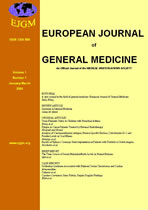
|
European Journal of General Medicine
Medical Investigations Society
ISSN: 1304-3897
Vol. 4, Num. 1, 2007, pp. 54
|
European Journal of General Medicine, Vol. 4, No. 1, 2007, pp. 54
BRIEF REPORT
TWO ENDOCRINOLOGICAL DISORDERS WITH ONE PSYCHIATRIC AGENT
Mehmet Akif Buyukbese1, Cem Basmaci1, Numan Konuk2
Gaziantep University Faculty of Medicine, Department of Internal Medicine1, Gaziantep, Karaelmas University, Faculty of Medicine, Department of Psychiatry2, Zonguldak,Turkey
Correspondence: Mehmet Akif Buyukbese, MD. Department of Internal Medicine. Faculty of Medicine. University of Gaziantep. Gaziantep-TURKEY.Tel: 903423606060 (76171), E-mail: akif_buyukbese@yahoo.com
Code Number: gm07013
Intensive laboratory work-up in any patient visiting outpatient department of internal medicine may be essential so as to contribute to his or her well-being. Below a 41 year-old woman will be presented because of complains of over-urination and polydipsia. She was not receiving any anti-diabetic medication and having no relatives with this condition. Her past medical history revealed bipolar disorder for about 12 years which was being managed via lithium as a dose of 2x300 mg. Her physical examination demonstrated goitre which was comfirmed by ultrasonography. There was 2x2 cm nodule formation on the left side of the gland. Other systems were within normal limits. After ruling-out psychogenic polydipsia soon after consultation with psychiatric department as she would need advanced care for her new endocrine disorder added to her former bipolar disease. 24-hr urine collection was planned with careful observation. She was diagnosed as autoimmune hypothyroidism which was evident by high titers of anti-thyroid peroxidase antibody associated with low free thyroid homons and extremely high TSH level (15-fold higher than upper limit of normal values). Second endocrinological abnormality was diabetes insipidus with low urine osmolality, low urine density and high normal (upper-limit of normal) serum osmolality owing to dilution of the serum with the contribution of hypothyroidism.
Lithium has been established as a useful drug for the treatment of bipolar disorder (1). But it has been shown to give rise to some side effects over endocrine functions such as hyperparathyroidism, hypothyroidism, thyrotoxicosis, weight gain, and renal toxicity, which may present as nephrogenous diabetes insipidus (2,3). In conclusion, we suggest taking into consideration of above mentioned problems during long-term lithium treatment, frequent consultations between these two disciplines as internal medicine and psychiatry may help realize earlier for diagnosis and future follow-up program
REFERENCES
- Dunner DL. Optimizing lithium treatment. J Clin Psychiatry 2000; 61:76-81
- Livingstone C, Rampes H. Lithium: a review of its metabolic adverse effects. J Psychopharmacol 2006;20:347-55
- Kalenderoglu A, Ozen ME, Selek S, Savas E, Savas HA: Persistent nephrogenic diabetes insipidus after discontinuation of lithium: a case report, Düşünen adam: J Psychiatry NeurologicalSciences 2006;19:50-54 (Turkish published, Abstract English)
Copyright 2007 - Medical Investigations Society
|
